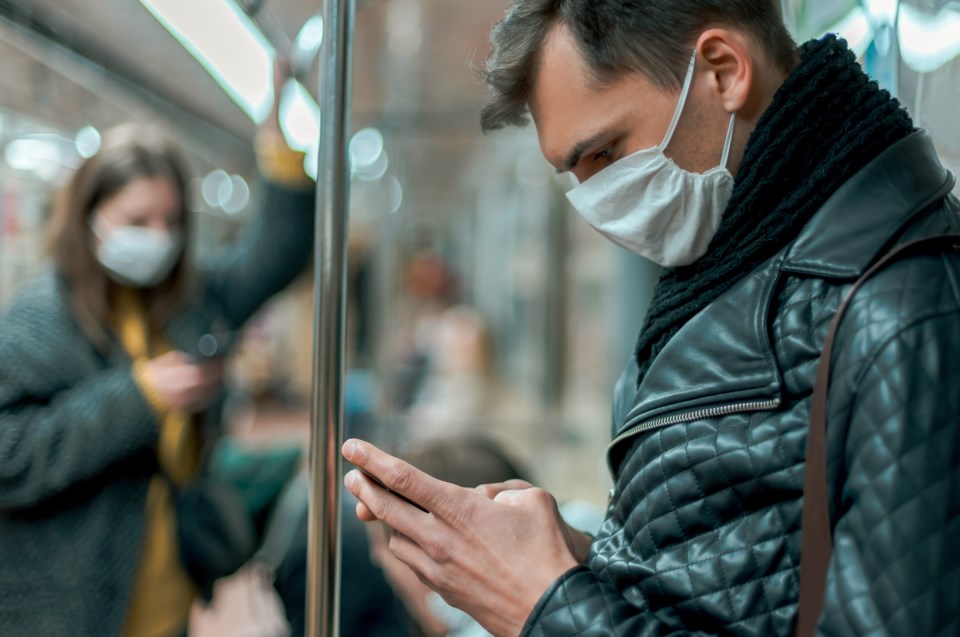B.C. has recently been able to contain the spread of COVID-19, while watching the number of serious infections steadily decline.
There are now 211 COVID-19 patients in B.C. hospitals, which is the lowest number since September 2. Of those, 72 are in intensive care units (ICUs,) which is the fewest since August 20.
Three additional deaths from the disease in the past day raises the province's pandemic death toll to 2,381. Those deaths included individuals in the Fraser Health, Vancouver Coastal Health, and Island Health regions.
The number of new COVID-19 infections in B.C. rose to 437, which is the highest single-day count since November 19, but 14,535 tests were conducted in the past day, which is the highest number in weeks. The positive-test rate in the past day was 3%, which is lower than that rate was earlier this week.
The 437 new infections in the past day include:
• 105 in Fraser Health;
• 90 in Vancouver Coastal Health;
• 93 in Interior Health;
• 22 in Northern Health;
• 127 in Island Health.
Glacier Media's broke down the 437 new infections by health region, for each 10,000 residents, to show which areas proportionally have more cases. The result was:
• 0.6 in Fraser Health;
• 0.7 in Vancouver Coastal Health;
• 1.3 in Interior Health;
• 0.7 in Northern Health; and
• 1.5 in Island Health.
The higher number of daily cases means new infections outpaced recoveries in the past day, lifting the number of known active infections to 2,994 – the highest since December 3.
Those 2,994 infections include:
• 871 in Fraser Health;
• 589 in Vancouver Coastal Health;
• 575 in Interior Health;
• 243 in Northern Health; and
• 664 in Island Health; and
• two people who normally live outside B.C.
For the second day in a row the total number of active infections is 50 people more than are counted in the regional breakdown. Yesterday, the government explained that "50 cases are reflected on the BCCDC (British Columbia Centre for Disease Control) dashboard due to a data reconciliation and are no longer active." It is unclear why these inactive cases remain counted as being active cases. No one from the B.C. Ministry of Health was available late Friday afternoon to explain.
The result by health region, for those 2,994 people fighting active infections, for each 10,000 residents is:
• 4.8 in Fraser Health;
• 4.7 in Vancouver Coastal Health;
• 7.7 in Interior Health;
• 8.1 in Northern Health (734); and
• 7.8 in Island Health (572).
Of the 222,013 people known to have contracted COVID-19 in B.C., 216,542, or nearly 97.6%, are deemed by the province to have recovered. So far B.C. has identified 10 cases of the Omircon variant.
The B.C. government usually considers COVID-19 patients to have recovered if they have gone 10 days following first feeling symptoms, as they are therefore deemed to no longer be infectious. Some patients, however, continue to have health problems for months after their recoveries.
Unvaccinated people continue to be the ones most spreading the disease.
Between December 1 and December 7, people not fully vaccinated accounted for 57.7% of new cases, and between November 24 and December 7, those individuals accounted for 63.5% of hospitalizations.
This is despite the vast majority of British Columbians being fully vaccinated.
B.C. government data show that 4,288,204 residents have had at least one dose of vaccine, while 4,097,320, or 95.5% of those are fully vaccinated with two doses.
Children as young as five years old started to get vaccinated on November 29, and as a result there has been a jump in the number of new people getting their first doses of vaccine. There were 6,596 people who got their first dose of vaccine in B.C. in the past day. Another 2,781 received their second dose.
The B.C. government estimates that 86% of eligible British Columbians, older than five years, have had at least one vaccine shot, while 82.2% of that eligible group is fully vaccinated with two jabs.
The B.C. government last year estimated in that the province's total population is 5,147,712, so Glacier Media's calculation is that nearly 83.3% of B.C.'s total population has had at least one dose of vaccine, and 79.6% of the province's total population has had two doses.
Booster shots in B.C. have started to be given to immunocompromised people, those older than 70 years who have gone six months after their second dose, as well as to healthcare workers and those who received two AstraZeneca doses of vaccine, and have gone six months since their second dose. Others older than 18 years are expected to be allowed, in stages, to get booster doses in 2022.
So far, 562,602 people in B.C. have received their booster dose, according to today's data. That is 20,193 more than yesterday, and the highest number of booster shots given in a single day so far. Most of the booster doses have so far gone to people older than 70 years old.
There were no new outbreaks at health-care facilities in the past day. That leaves the province with five such outbreaks. •



